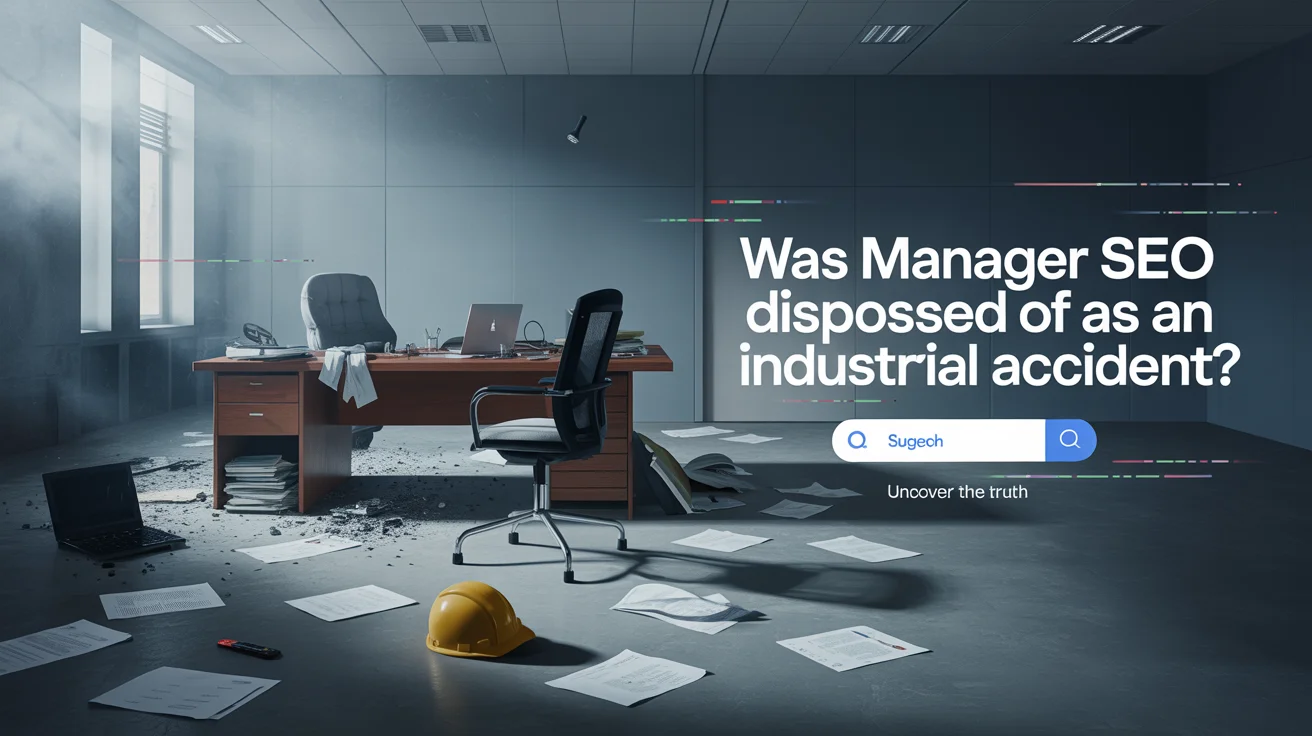The question “Was Manager SEO Disposed of as an Industrial Accident?” may sound dramatic, but it reflects a growing concern in digital workplaces. When SEO managers suddenly disappear from their roles, doubts arise. Was it burnout, mismanagement, or a more complex corporate strategy?
Traditionally, industrial accidents refer to physical injuries. However, in today’s fast-paced digital environment, the definition is evolving. Many now question whether severe workplace stress, especially in SEO roles, could qualify as a different kind of “accident.”
Understanding Industrial Accidents in Corporate Settings

In classical terms, industrial accidents happen on factory floors or construction sites. However, modern workplaces now face a new kind of challenge: mental burnout and emotional strain. Especially in digital fields, such as SEO management, employees may suffer silently before abruptly exiting.
So, when asking “Was Manager SEO Disposed of as an Industrial Accident?”, we must look deeper into what an accident means in this new digital age.
These incidents are often:
- Unexpected and unplanned
- Causing mental or physical harm
- Disruptive to workflow and team dynamics
Mental health issues caused by intense corporate pressure may not leave physical scars, but can still disrupt careers, sometimes permanently.
The Role and Pressure on SEO Managers
SEO managers are the engine behind online visibility. They handle performance tracking, algorithm changes, and demanding KPIs. It’s no surprise that their stress levels often reach breaking points.
Many SEO managers quit because of:
- Continuous algorithm shifts from Google
- Tight performance targets
- Cross-departmental pressure
- Lack of mental health support
This pressure may explain why we hear whispers like “Was Manager SEO Disposed of as an Industrial Accident?” in digital corridors.
Clues That Hint Toward an “Industrial Accident” Exit
Sometimes, when an SEO manager suddenly leaves a company without any clear explanation, it raises suspicions that their exit might have been disguised as an “industrial accident.” In such cases, sure signs point toward this possibility.
For example, the company might give vague or inconsistent statements about the manager’s departure, leaving both employees and outsiders confused. Additionally, the manager’s sudden cessation of communication without prior notice is unusual in a professional setting.
The organization’s reluctance to discuss or provide details about the incident further increases suspicion. When these factors combine, it often suggests that the official story might be covering up deeper problems behind the scenes.
Corporate Approach to Managerial Disappearance
When a manager suddenly disappears or leaves under unclear circumstances, companies typically follow a formal approach to handle the situation. This process normally begins with a thorough investigation to understand what happened and ensure that all legal and safety protocols are followed.
Organizations usually provide medical and psychological support to the affected manager, recognizing the stress that such situations can cause. At the same time, interim leaders or temporary replacements are appointed to maintain smooth business operations.
Throughout this process, companies tend to keep details confidential to protect the privacy of the individual involved. They also ensure transparent reporting to relevant authorities, which helps maintain accountability and prevent similar incidents in the future.
Why a Company Might Label an Exit This Way
Companies sometimes choose to describe a manager’s departure as an “industrial accident” to protect their reputation and avoid negative publicity. This label can help conceal internal conflicts or mismanagement that the company does not want to disclose publicly.
It also helps maintain confidence among shareholders and clients by presenting the exit as an unfortunate but unavoidable event. Additionally, framing the exit this way can shield the company from potential legal issues or lawsuits.
In high-pressure industries, such tactics, although rare, are sometimes employed to create a more favorable narrative around difficult decisions.
Impact on SEO Teams and Work Culture
The sudden departure of an SEO manager, especially under unclear or mysterious circumstances, can have a profound impact on the SEO team and the overall work culture. Losing a key leader often disrupts ongoing projects, causing delays and confusion.
Team members may feel anxious about their job security and uncertain about future directions, which can reduce morale and productivity. This stress can sometimes lead to burnout among remaining employees, who may be required to take on additional responsibilities.
Furthermore, necessary knowledge and expertise can be lost, making it harder for the team to maintain momentum and achieve their goals.
Consequences of an Unexpected Managerial Exit on SEO Teams
- Temporary loss of leadership and direction
- Increased workload and stress on the remaining team members
- Drop in team morale and motivation.
- Delays in project timelines and deliverables
- Knowledge gaps and reduced efficiency
- Potential increase in staff turnover
Examples from Across Industries
Across various industries, there have been instances where managerial exits were officially described as industrial accidents or similarly vague incidents. In manufacturing, for example, supervisors have sometimes disappeared following workplace accidents, leading to investigations and, in some cases, legal battles.
In the technology sector, mental health crises caused by intense work pressure have been recorded as workplace incidents to provide support and limit company liability. Corporate restructuring in many fields often results in quiet removals of managers without clear explanations, aiming to protect the company’s reputation and maintain investor confidence.
These examples illustrate how companies can manage sensitive managerial departures, sometimes blurring the distinction between an accident and a strategic exit.
Conclusion:
The phrase “Was Manager SEO Disposed of as an Industrial Accident?” is loaded, but essential. In today’s digital economy, mental exhaustion is a genuine concern, and companies may sometimes misuse terminology to mask internal failures.
Instead of hiding behind euphemisms, transparency and employee support are key. Whether a manager leaves due to burnout, conflict, or a change in strategy, companies must acknowledge the human element behind the role.
Frequently Asked Questions
Q1: What qualifies as an industrial accident today?
A: Traditionally, physical harm, but now may include workplace stress or mental breakdowns in some contexts.
Q2: Why would a company hide the real reason for a manager’s exit?
A: To protect its image, avoid legal issues, or manage public perception.
Q3: Is mental burnout in SEO jobs typical?
A: Yes, SEO managers often deal with algorithm changes, tight KPIs, and high pressure, making them vulnerable.
Q4: Can workplace stress be considered an accident?
A: In some progressive definitions, yes, especially if it leads to health issues.
Q5: How can such exits be avoided?
A: By fostering supportive environments, offering mental health tools, and encouraging open dialogue.



